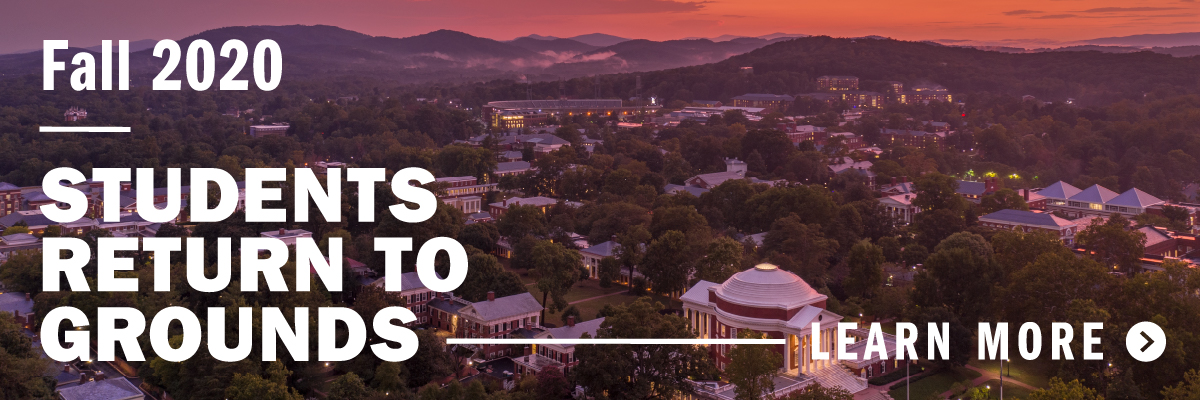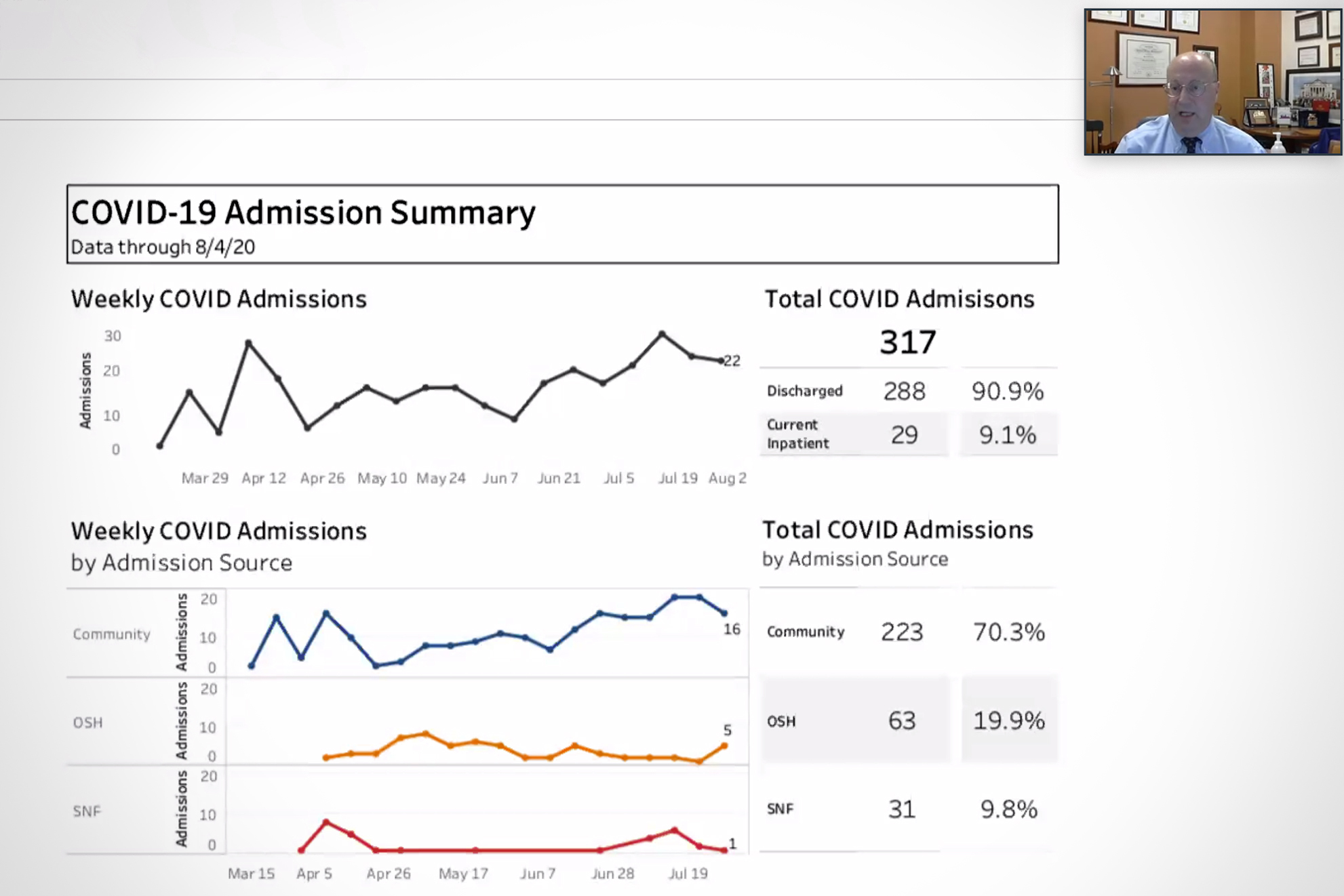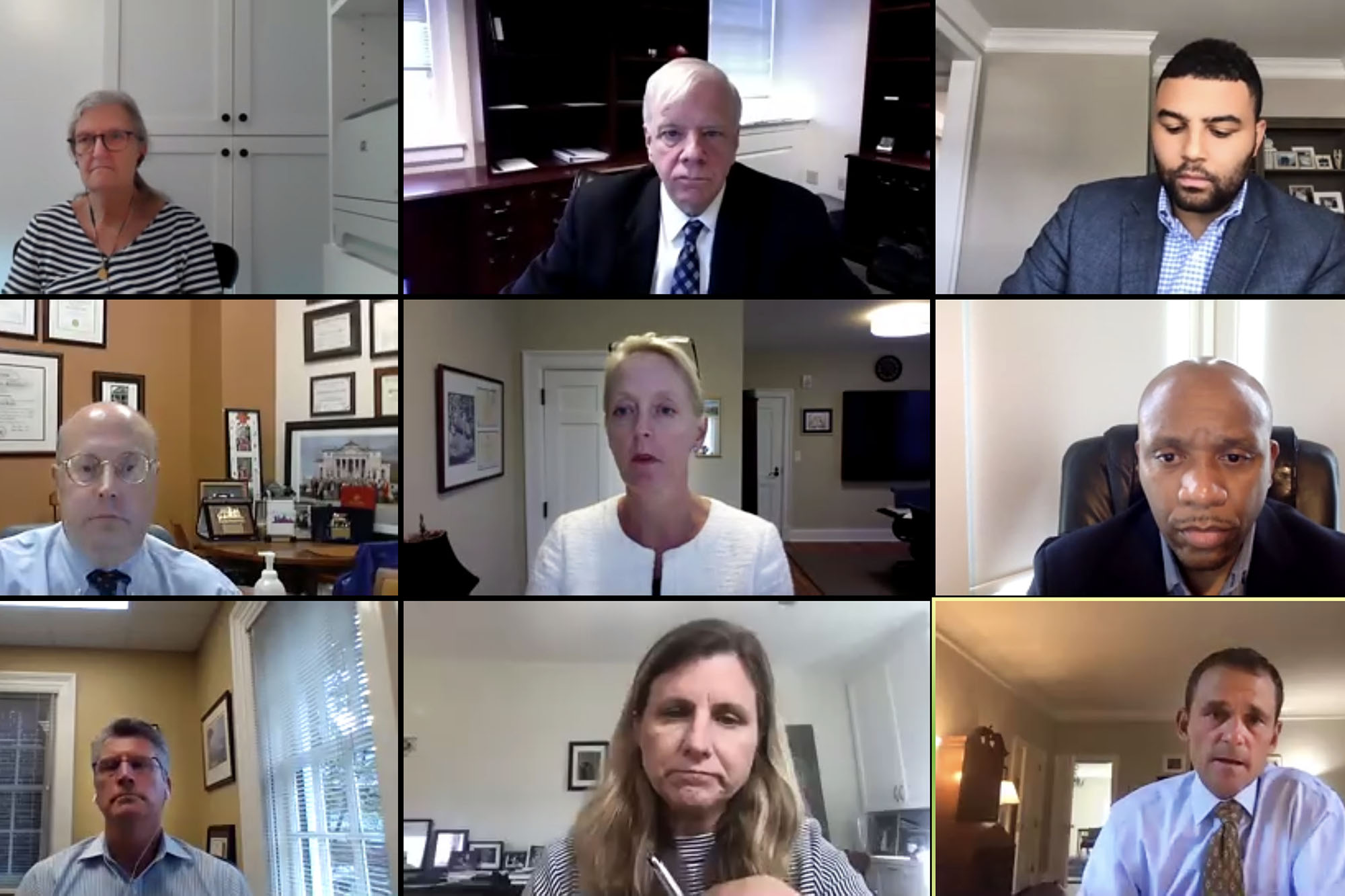In a virtual town hall on Monday evening, University of Virginia leaders spoke with community members from Charlottesville and surrounding areas and answered their questions about the upcoming fall semester.
To start, UVA President Jim Ryan acknowledged the close ties between UVA and the surrounding Charlottesville and regional community, ties that have become even more important during this pandemic.
“One of my goals as president has been to make UVA a better neighbor to the Charlottesville region,” he said, citing efforts including raising UVA’s minimum wage and work on issues like affordable housing and equity. “We understand that what we do on Grounds matters beyond Grounds, and that we really are in this together. As we get closer to the start of in-person classes, we will do our best to make the best decisions we can for students, faculty, staff and this community, and we will continue to engage with this community.”
Monday’s session included Ryan, Provost Liz Magill, Executive Vice President for Health Affairs Dr. K. Craig Kent, Executive Vice President and Chief Operating Officer J.J. Davis, Vice President and Chief Student Affairs Officer Pat Lampkin, Vice President for Diversity, Equity and Inclusion Kevin McDonald, Department of Medicine Chair Dr. Mitchell Rosner, Equity Center Executive Director Ben Allen and University Counsel Timothy Heaphy.
You can view a full recording of Monday’s town hall here. A similar town hall was held on Friday for students, faculty and staff, and another virtual town hall for parents will be held this Friday at 3 p.m., with more details to come.

Ryan began Monday’s session by discussing recent decisions, such as a two-week delay in in-person undergraduate courses, and the public health requirements that UVA is asking students, faculty and staff to adhere to.
“In preparation for students returning, we have established a set of expectations and requirements for students, faculty and staff to follow, including wearing masks, maintaining proper physical distance and limiting social gatherings to no more than 15 people, which means no large parties,” Ryan said. “We also have criteria we will monitor daily in order to determine if we need to change course.”
Those criteria, which Rosner outlined for attendees, along with current data on the virus’ spread, include the prevalence of the virus in the region, the availability of testing supplies, supplies of protective equipment, hospital capacity and other factors.
Kent addressed hospital readiness, expressing confidence that UVA Health has the capacity, both in terms of beds and people, to address a surge in the virus and care for COVID-19 patients now and through the fall. So far, he said, the number of COVID-19 patients in the hospital has ranged between 20 and 30 daily.
Kent also highlighted new community testing efforts, as UVA Health will oversee four free COVID-19 testing sites each week in the Charlottesville region, with two fixed sites for drive-in and walk-up testing and two additional sites determined by epidemiological and community need.

One slide showed a recent snapshot of COVID admissions at UVA Health.
Others addressed a variety of community partnerships and resources through the UVA Equity Center; the President’s Council on UVA-Community Partnerships, which Ryan meets with regularly; and other groups like the UVA Employee Volunteer Center, which is partnering with various Charlottesville organizations to support the region’s COVID-19 response and recovery efforts.
“Units from across Grounds have felt compelled to leverage their resources and strengthen internal communications efforts in a way that can better serve our Charlottesville and Albemarle communities during this extremely challenging pandemic,” McDonald said. “From the creation of an employee volunteer center to better share opportunities for our faculty and staff to get involved throughout our local community to the more targeted efforts in the creation of testing clinics and areas identified and supported by our community, this group has been energized to leverage human resources to better coordinate support efforts, and in some cases, create pillars of support.”
Lampkin and Heaphy explained that restrictions and requirements aimed at students will be enforced through a combination of education, and when necessary, sanctions and suspension. Members of the community will be able to report violations, and submit details, photos and videos, through a form that will be posted to UVA’s website and shared with the community.
Lampkin said she has been in regular conversation with many student leaders and feels confident in their commitment. However, should requirements be violated, her office will not hesitate to act quickly.
“We have established clear rules that students must agree to in returning, including wearing a mask, practicing physical distancing and keeping gatherings to 15 people at most,” she said. “[Failure to exhibit] such behavior will result in consequences and disciplinary actions.”
Heaphy noted that the requirements apply both on Grounds and in the Charlottesville and Albemarle community, and that the University can take action against organizations, as well as individuals, that violate the restrictions.
Davis and Magill spoke about precautions in workplaces and classrooms, including providing personal protective equipment for students and employees, evaluating every room’s capacity to meet physical distancing requirements, enhancing cleaning protocols, setting up more than 2,500 hand sanitizer stations throughout Grounds and coming up with new transportation and busing plans to promote safe distance between passengers.
Davis noted that UVA will provide two cloth masks to every student, faculty and staff member, and that the masks were purchased from a local small business, Bright Ideas. She also addressed accommodations for employee needs like elder care and child care, particularly urgent as Charlottesville and Albemarle schools will both begin online.
Magill said that approximately 2,000 students have already returned to Grounds as UVA has restarted some of its research and graduate programs this summer, and that the return, with safety measures in place, has gone well so far.
“The many changes to our operations have been working, as we have approached this cautiously over the last few months,” she said.
Allen, the executive director of the Equity Center, said communication must continue to be a two-way street as more students return to Grounds.
“We want to ensure that we are providing a full two-way dialogue [with community members] and co-creating plans going forward at decision-making points,” he said.
After giving updates, the leaders took many questions on topics ranging from fraternities and sororities – which are subject to restrictions, as are other student organizations – to hospital capacity, support for employees and the possible confluence of flu and COVID later in the fall.
Answers to many of those questions, including questions that did not get addressed in the one-hour town hall, will be added to the Return to Grounds site, where there is an FAQ section for community members.
Media Contact
Article Information
August 10, 2020
/content/monday-town-hall-addresses-community-members-questions-about-fall-semester

